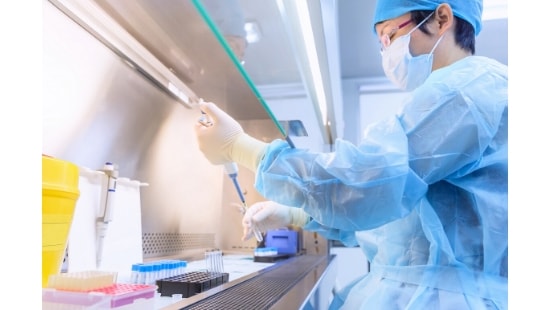In the Race for a Vaccine
Ecolab supports cleanroom environments for the University of Oxford’s Clinical BioManufacturing Facility COVID-19 vaccine development and manufacture

More than three billion people are currently experiencing some form of restriction on their movement or are in lockdown to try to slow the spread of COVID-19. A global race is underway to develop a vaccine or drug treatment to halt the pandemic. The Jenner Institute, University of Oxford, has announced significant progress in developing and manufacturing ChAdOx1 nCoV-19, a vaccine against COVID-19. The first volunteers of the Phase I/II clinical trial were vaccinated on 23rd April 2020, with the aim of vaccinating up to 800 further volunteers in the coming weeks. The manufacturing of ChAdOx1 nCoV-19 was performed at the Jenner Institute’s Clinical Biomanufacturing Facility, an MHRA-approved site licensed to manufacture investigational medicinal products, including vaccines, according to the principles of Good Manufacturing Practice (GMP).
The Ecolab Life Sciences team in the UK has provided essential support for the research efforts, which are supported by the UK government. To develop a vaccine, a laboratory needs to operate in a controlled environment. The workers need a contamination-free background to carry out their testing and manipulations, to avoid compromising the results of their work. Ecolab provides a range of validated products for use in cleanroom environments and expertise to protect and support the operators.
"Ecolab has been a true partner and we are all very impressed with the team that has been putting in huge efforts to help us manage this important work."
Dr. Cathy Oliveira
GMP Production Manager at the Clinical BioManufacturing Facility.
From irradiated and aseptically filled products that are triple bagged for ease of transfer into the highest-grade areas, to technical guidance supporting optimum surface disinfection, the Life Sciences team has been on call to help the Clinical Biomanufacturing Facility accelerate the production of the ChAdOx1 nCoV-19 vaccine.
“Ecolab has been a true partner and we are all very impressed with the team that has been putting in huge efforts to help us manage this important work,” said Dr. Cathy Oliveira, GMP Production Manager at the Clinical Biomanufacturing Facility. “From the logistics to the technical team, everyone has been very accommodating and collaborative.”
Work on the vaccine, developed by clinical teams at the University of Oxford's Jenner Institute and Oxford Vaccine Group, began in January at the Old Road Campus Research Building in Oxford. Its unique technology had already been used to develop treatments against other viral diseases. After successful pre-clinical testing and the start of Oxford’s COVID-19 vaccine trial the fast-tracking of manufacturing Phase III material for administration to 5,000 volunteers has begun and Professor Sarah Gilbert, the lead researcher developing the vaccine, says that although one can never be certain of the success of a vaccine, she is quite confident based on results from a different vaccine that has recently been tested in a clinical trial to test efficacy against Middle East respiratory syndrome coronavirus (ChAdOx1 MERS).
“We have been working with the University of Oxford, and particularly, the Clinical Biomanufacturing Facility, for the past two years,” said Gerald Morris, account manager for Ecolab’s Life Sciences division, who supports the University of Oxford remotely during the lockdown. “In the current climate, when all our products are in high demand, the Ecolab team knows how important and ground-breaking this work is and has always mobilized quickly to support and deliver what they need.”
Demand for Ecolab’s sterile products from the Clinical Biomanufacturing Facility has increased by 200 percent to support the surge in research, development, and manufacture. The collaboration will continue with the same intensity for some time, and if hope transforms into reality, mass production would begin. The Jenner Institute has already taken action to prepare to manufacture up to one million doses a month, and other pharmaceutical organizations would join in with the effort.
Although the exact timing for an approved vaccine is unknown, what is certain is that hygiene will be more important than ever. The consortium of pharmaceutical organizations that will produce the vaccine will need more sterile products to ensure safe manufacturing of massive quantities of doses. Operations to vaccinate billions of people around the world to put an end to the pandemic also will make hygiene practices crucial. Ecolab is gearing up, increasing production and providing expertise to support the scientific and pharmaceutical industry in its race to start production of a working vaccine.


